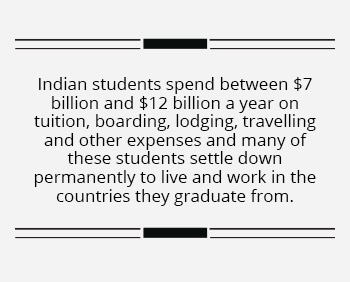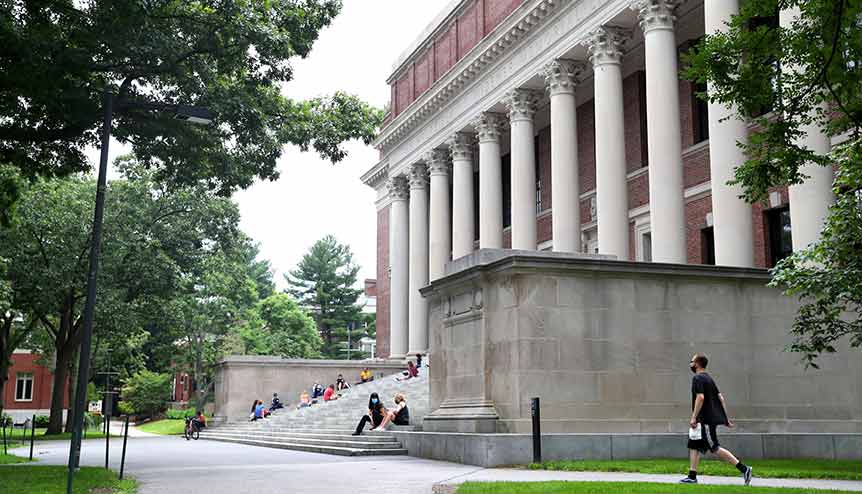
The New Education Policy announced by the Modi government has allowed foreign universities to open campuses in India. This can raise the standards of higher education in the country and help it become a higher education hub in Asia. But the government will have to clarify the fine print before the first such institution opens its doors.
The proposal in the New Education Policy 2020 to allow foreign universities to set up offshore campuses in India can significantly alter the dynamics of higher education in India. It can also save India significant amounts of foreign exchange and, over time, also become a source of foreign exchange earnings if overseas students also choose to enrol at these campuses.
Related stories: New Education Policy to make India’s youth future-ready
A lesson in learning for UK Universities

Indian students spend between $7 billion and $12 billion a year on tuition, boarding, lodging, travelling and other expenses and many of these students settle down permanently to live and work in the countries they graduate from.
The most popular foreign destinations are the US, the UK, Australia, New Zealand, Canada and Singapore. In recent years, universities in Germany, the Netherlands, Switzerland, France and China have also begun attracting students from India.

A view of Harvard Yard in Harvard University. Indian students opt to study abroad due to the quality of education, higher acceptance rates and because most Indian colleges follow outdated syllabi and lack quality faculty.
The main reason why so many Indian students go abroad to study is the quality of pedagogy in foreign universities. Most Indian colleges follow outdated syllabi and their faculty is often not comparable to those in US and European institutions. Then, research facilities outside of a handful of top-ranked colleges are poor or non-existent.
Despite great economic progress since 1991, Indian planners have not invested as much attention and money on education and its related infrastructure as is required for an economy that has grown to become the world’s fifth largest. This has led to a huge mismatch between demand and supply.
Since the competition for seats in top institutes like IITs and IIMs is very tough and the acceptance rate very low – 0.7 per cent for IITs and 0.25 per cent for IIMs, compared to 3.7 per cent for MIT and 5.2 per cent for Harvard University – students who can afford it prefer to study in foreign universities.
Have you read?
A visa game changer for UK-India education ties
BHU professors and students celebrate after the government approved new National Education Policy. Many politicians in the past have felt that allowing foreign universities to open campuses in India would raise the cost of higher education.
The case for investing in education in India
The New Education Policy 2020 promises to facilitate the entry of the world’s top 100 universities via the passage of a new law to be enacted for this purpose.
“A legislative framework facilitating such entry (of foreign universities) will be put in place, and such universities will be given special dispensation regarding regulatory, governance, and content norms on par with other autonomous institutions of India,” it says.
In the past, many political leaders and educationists in India felt that allowing foreign universities to open campuses in India would raise the cost of higher education in the country. They also felt that these institutions would poach the best faculty members from existing Indian universities, thus, dealing a double whammy to the nation’s higher education infrastructure.
Several attempts to allow the entry of foreign universities have failed in the past because of this line of thinking. The first such move, in 1995, failed. The second attempt, a decade later, failed to even get the approval of the then Manmohan Singh Cabinet. During UPA II, yet another attempt to pass the Foreign Educational Institutions (Regulation of Entry and Operations) Bill, 2010 failed to pass muster and lapsed with the completion of the term of that Parliament.
You might also like to read:
A vision to provide high-quality, personalised education across the world
Education at the heart of creating real impact on the ground
The proposed entry of the 100 top foreign universities into India will, thus, help address a latent demand for quality higher education. The resulting competition for both the best students and the most talented faculty is expected to raise the overall standards of higher education across the board in India and improve the quality of institutions that are currently ranked below the top tier.
As the Indian campuses of foreign universities gain global acceptance, some foreign students may also enrol to study in them. Thus, the decision to allow the entry of foreign universities in India can become the first step towards turning India into an education hub in Asia.
Minister for Education Ramesh Pokhriyal Nishank hands over the final policy document of the National Education Policy 2020 to the Vice President M. Venkaiah Naidu. It is not clear if fee caps will apply to foreign universities.
The details of the policy to allow foreign universities to set up campuses in India have not yet been announced. But experts are already red flagging the government’s announcement of strict fee caps at higher education institutions. It is not yet clear if these caps will apply – and to what extent – to foreign universities.
Then, the regulatory regime under which they will be allowed, the freedom they will get to fly in foreign faculty, the independence they will demand on curriculum design and various other issues that have held up their entry for so many decades are yet to be finalised.
The Modi government has signalled a very important declaration of intent.
UK Ministers, Shadow Cabinet leaders, diplomats, business chiefs come together for India Global Forum’s grand Diwali Reception in London Read… Read More
At the India Global Forum’s (IGF) grand Diwali reception in London this week, UK Home Secretary Suella Braverman focussed her message of… Read More
Home Secretary Suella Braverman has said the UK is eager to secure a trade deal with India to boost both… Read More
Chandrasekhar also attended a session on the Future of Digital at the India Global Forum where he spoke on the… Read More
India Global Forum’s glittering awards ceremony with Guest of Honour, UK Chancellor Rishi Sunak, to mark the culmination of a… Read More
The UK government on Wednesday announced 75 fully-funded scholarships for Indian students to study in the UK, beginning September 2022,… Read More
View Comments